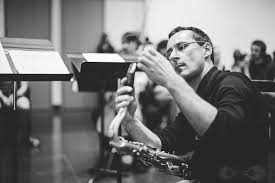Impacts of the pandemic on musicians in Switzerland and the United States
Laurent Estoppey, composer, saxophonist, sound artist and artistic director of the Ensemble BaBel Lausanne, has been a musical bridge between Europe and the United States for many years and launched many intercontinental collaboration projects between experimental, transdisciplinary, improvised music as well as sound art.
As expert of both continents, I invited him to state his points of view on the consequences of the corona virus pandemic relating to musical creation on both sides of the Atlantic.
After conducting a large-scale survey, Estoppey concluded that the pandemic revealed the system’s fragility and encouraged a fundamental questioning of the music industry as such, but also inspired new methods of creation and collaboration.
Read his insights in the two-part series below:

1/2 face the facts
Laurent Estoppey
Well, let’s not beat around the bush, we’ve all been hit very heavily by this situation and not “only” financially, but deeply and on all levels, we faced an existential crisis that forces us to imagine and seek other possibilities.
Is the pandemic and its consequences experienced in the same way on both sides of the Atlantic?
To try and answer this question – since there are almost as many situations as there are musicians – at the beginning of June I sent a short questionnaire to some forty musicians who all have rather independent activities in the fields of contemporary, improvised and experimental music.
Ensemble Babel, Christian Marclay: Screenplay part.2
I was particularly touched by the feedback’s generosity and honesty, which of course reflects the need to express oneself in this time of need and frustration. I had expected rather short answers, but many developed several points and gave numerous inputs for reflection.
To my great surprise, the artistic reactions are absolutely the same for most of them.
The only big difference is that musicians in the United States have little or no possibility of compensation (knowing that fees – when they exist – are much lower than in Switzerland or Europe in general and the possibilities of private or public subsidies are five to ten times lower).
Ensemble Batida, Haiku
“We all realize that, even if money is important, it is not the main thing. The last few months have prevented projects from happening, which generates an immense feeling doubt for most of us. »
“This situation influences my life and therefore also my artistic practice, but in a rather global way, which will reveal itself entirely only later on, I believe.»
If for many Americans, making music has little to do with economic aspects, Swiss musicians faced the great precariousness of our profession through the pandemic. “Like many people in this profession, I protect myself by having a second job. »
Julien Mégroz, Défibrillation décongelée
The general reactions to the crisis were – of course – quite similar: first frustration, the reaction to the forced stop, then discovery of other spaces, physical as well as temporal, which led to a deep introspection and to a great questioning – at least until the activities seemed to start again – of the “previous” situation.
“Am I creator or project manager?”
Let’s go back to that “previous” situation with a few statements many can relate to:
“In a way this shows the fragility of a system. Music is the weakest link of performing arts. Mainly because it has not been able to professionally develop and establish itself in the same way as theatre or dance.”
“This crisis highlights the precarious way the musician’s profession is considered in Switzerland, one does what he or she can to earn a living and put aside enough time to create».
“This brought the precariousness and dysfunctions of the creative music branch to light. »
“Does this approach really generate quality or does it just add ‘events’ to the quantity of cultural products in an area?
What do I really have to say as an artist? Do I want to depend on a cultural market and state or private funding and support for a long time to come?
Am I creator or project manager?”
Laurent Estoppey, Always something there
All the issues that were already at hand before the crisis are crucial. However, there is a frightening difference on both sides of the Atlantic. Whereas the Americans have long since given up on the possibility of real income through their artistic activities (most of them teach full-time or have totally different professions “to pay the bills”, such as computer scientists, translators, graphic designers, etc. and very little time to devote to concerts), the Swiss want to believe in a greater appreciation of their art.
But: “We are asked to be creative, to bounce back, find solutions, whereas in my opinion the fight is political and the question is: do we want real and proper working conditions for artists and musicians? »
Laurent Estoppey (1/2 )
Here some links to specific projects carried out during lockdown times:
Atomwrec Bob Parking Garage Bidness
Brice Catherin / Noisebringers
Jacques Demierre Decálogo Sonoro – 3° entrega
Nicolas Lira 72 seconds solos
Dragos Tara Lisières (avec entre autres Patricia Bosshard, Laurent Estoppey…)
Andrew Weathers Llano Estacado Monad Band
Association Insubordinations / Cyril Bondy, Jacques Demierre, Anouck Genthon…
ensemBle baBel Walking Venezia
Hyper-Duo (Julien Mégroz et Gilles Grimaître)
Article suggéré par Julien Mégroz
Quotes in italics are from musicians who participated in the survey:
Antonio Albanese, Aaron Bachelder, Cyril Bondi, Patricia Bosshard, Laurent Bruttin, Brice Catherin, Vattel Cherry, Jacques Demierre, Susan Fancher, Edmée Fleury, Antoine Francoise, Shawn Galvin, Anouck Genthon, James Gilmore, Gary Heidt, Jonas Kocher, Antoine Läng, Nicolas Lira, Julien Mégroz, David Meier, David Menestres, Luc Müller ,Raphaël Ortis, Robert Pence, Will Redman, Noëlle Reymond, Viva Sanchez, Dragos Tara, Vinz Vonlanthen, Andrew Weathers.
Many thanks to you all!
Neo-Profiles: Laurent Estoppey, Association Amalthea, Julien Mégroz, Jonas Kocher, Dragos Tara, Ensemble Babel, Jacques Demierre

